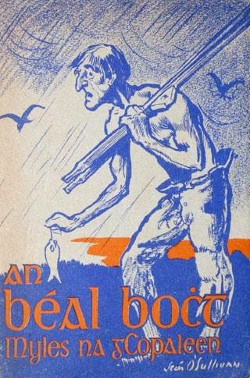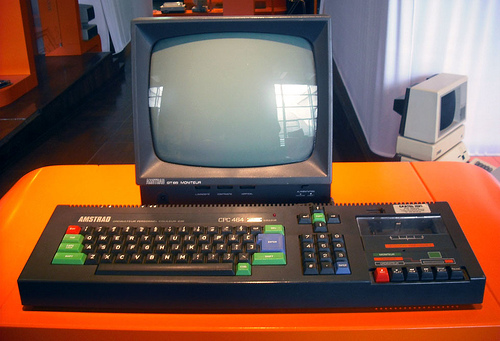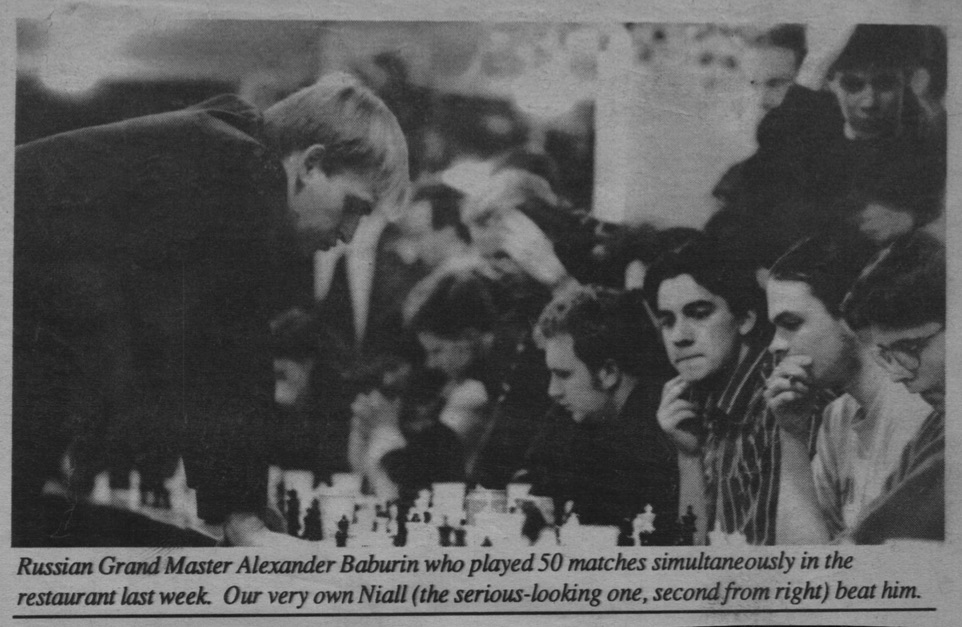In My Beginning Is My End
I didn’t think of myself as a revolutionary , but in a small, entirely un-self-aware way, I was.
The first wave of commercial home computer deployments washed over Ireland in the 80s, and swept me along with it. For those of you convinced I was a nerd from the beginning - and how hateful a word that was, back then - you’ll be nodding in agreement as I say that I’d been interested in computers, science-fiction and so on from a very early age, perhaps eight years old. My early memories of life are often hazy, but there was something deep in me which imprinted on Tom Baker as I hid behind the sofa from the Daleks. Nothing else could have explained the fervour with which I paced up and down in our asbestos sheds on the Navan Road, reading the Doctor Who novelisations that my single mother fed me like other mothers fed their children cough drops or castor oil.

So much bowing and scraping, their lumbar vertebrae gave way
Ireland in the 70s and 80s was, in many respects, an unreal place, outwardly devotional to Catholicism and Christianity (with big Cs), but with much in the way of state-sponsored infrastructure that behaved nothing like as charitably those words might lead you to believe. The ostensible unworldliness of public society was matched, in the adult world, by the worldliness of hidden actions for private gain.
In my child’s world, however, society was unreal precisely because someone else – presumably adults – was responsible for it. The only thing that was unquestionably real was the future, which was not present yet. I knew without even thinking about it that wherever we were going to be was more important than wherever we were, and I cannot even today find words to describe the strength of my conviction that despite my childhood being filled with freezing trips to the outdoor coal bunker, bullying at school, and repeated playings of Michael Jackson’s Thriller, that the future would be different – better.
The truth is, to this day, I don’t really know why I thought that. Many other computer-related memoirs I’ve looked at have the same problem: there’s no explanation. It’s just that from a very early age, I had an utterly unquestioned assumption that this was going to be big; was going to be part of our lives in the future; was going to be the underpinning of basically everything.(I guess it’s nice to be proved right, although I didn’t have that much to do with it.)
Ireland was a highly socially conservative country for much of that period. But, without Ireland quite realising it, that home computer revolution of the 80s became a social revolution too.
What do I mean? Children didn’t have much in the way of self-determination then, as was common in many other countries. Even fewer people listened to them than today. It wasn’t just a question of not being listened to, either: it was a question of the whole right to speak being eliminated, or strongly questioned at the very least. (In my opinion, an attitude which contributed directly to the prolongation of several abuse cases, as the perpetrators were much more likely to be believed than the victims.)
But computers were different, particularly home computers. They were obviously “toys”. Children could be given free rein there, and it wouldn’t interfere with real life. In fact, it could help to usefully distract them while the adults got on with arguing about money or filling in forms. Sovereignty in a micro-world didn’t matter.
Well, it actully turned out to matter a lot. It was on-the-job training, at scale. It was education by the back door. In the 80s computer revolution (brought on, as so many revolutions before and since, by the jolly figure of Saint Nick wearing a “V for Vendetta” mask) children were given enormous power. It was far beyond the power given to the generation before, not only over the supposedly “toy” world inside the computer, but also over the future. It gave them the experience of control as expressed through programming, and set expectations that it was right and proper for computing in general to be in the home, an effect which paved the way for the ubiquitous computing we have now. Finally, it facilitated and rewarded independent thinking; perhaps not the outcome many parents had in mind while queueing in the shopping centre with their whinging eight-year-old, but for some of those who got a keyboard and screen over Christmas, it was a gateway to independence, and self-respect.
My Amstrad 464
Amstrad 464 with green screen and tape drive. was the bare minimum to get started (we couldn’t afford anything more). It came with a small number of games (which I added to, slowly, over time), but more importantly came with BASIC, a language which was, again, the bare minimum to get started. It used a wax tablet to load programs – no, sorry, it used a cassette tape deck, a phrase which will make about as much sense as the previous one to many of my readers.
As it loaded programs in, it made a half-mechanical, half-agonised sound and it took about 10 minutes to load anything of significance. I wrote programs, typing them in from the magazines that were my connection to the outside world, and cursed like everyone else when a simple transcription error at line 1020 produced some code that didn’t work, or went wrong weirdly. I’ve been interviewed by people who will hire graduates of that generation of home computers by preference, reasoning that having to work with such primitive materials would instil the basicsPun intended. in you so thoroughly, you’d know them better than any of the folks who grew up with such hopeless luxuries as disk drives or network connections. I disagree, perhaps because I feel that – blundering around on my own as I was – I didn’t actually learn much in the way of computer science while I was typing in listings from magazines, but I did learn patience. (Particularly after the machine reset after spending an hour typing in something. I just learned to accept it.)In my opinion, what we have lost by moving to machines which concentrate less on the very incremental basics is more than made up for by not having to do everything from first principles each time; that gets pretty wearing on everyone.
Now at some point a few years in, this cassette deck went wonky and started speeding up and slowing down while loading programs. So the sound it made was a little more like the pitiful wailing of some kind of wolf, or lonely skunk. It wouldn’t load games reliably, and I was desperate, and we didn’t have the money to replace it. Then I discovered a work-around – if I stood the computer up on its edge, and waggled it back back and forth regularly, the movement kept the broken tape deck from getting too out of alignment, and loading worked! The one down-side was that every time I did that, it made a sound like THUNKA THUNKA THUNKA as the edges of the computer went back and forth, hitting the desk surface, and my mother would ask what the hell was going on. She only ever asked me after the THUNKA THUNKA THUNKA stopped, though…
Anyway, that was my beginning in computers. Now the phone I carry in my pocket is approximately one thousand nine hundred and fifty two times faster, but there are some things that haven’t changed: Saint Nick still brings anarchist bombs in his bag, and children still aren’t listened to.
Computers in university
By the time I arrived at UCD in the early nineties, computers were as well established there as they were in many other universities. In fact, they were perhaps a little more widely spread than on many other campuses; one of the most obvious signs of the penetration of computers, and computer-based communication into university life, was the sight of DEC VT100 terminal units 
Revolutionary, for their time. Distinctly conservative for the early 90s. plonked awkwardly on tables scattered around the arts block. They were clearly for serious business, though: even at that stage, those machines were old, and useful only for slow, phosphorescent textual readouts from a campus server sending nothing more engaging than class timetables and library searches.
This was the state of the art of computer communication for the masses. Elsewhere more exciting things were happening, but they were for staff members, postgrads, or other, more serious people.
I was in first year, and by all possible college metrics was Not Serious. This was deeply frustrating. Not only was I aware of a wider Internet world, which at that stage was a fraction of the size of what it is today, but my friends in Trinity, UCD’s quondam rival-partner, had basic email and and access to a glittering array of newsgroups, mailing lists, gopher sites, etc, as a function of their membership of the college. A number of those friends were generous enough to loan me their alf2A popular college server on which many a subversive conversation was had. account – quite against college regulations – and so I used to tailgate my way into a now-defunct computer lab called The Arches to slake my thirst for access.
I was thirsty for all of this beyond measure. All of human knowledge was potentially at my fingertips, and I dipped freely, if arbitrarily, in that pool. I read poetry, examined computer protocol specifications, discussed the lyrics of R.E.M., looked at analyses of Soviet military history, read reviews of economic treatises of tourism in Ireland, downloaded software for my Amiga 4000, and generally had a ball.For limited, but non-zero, values of ball. Although all of this was conducted, in general, over those same slow, text-based interfaces that only a word-nerd could love, I was in fact a word-nerd, and did love them. The presentation of the knowledge was irrelevant to its absorption. It was there, unmediated by professor or department, and all I had to do was read it, comprehend it, analyse it, use it.
It was infuriating that my humanities friends in this college had access and I, a science student,I did agonise somewhat over my college choice, and ultimately put science over arts, but it wasn’t actually open and shut. Adding to my pain, my assigned tutor in first year looked at my Leaving Cert results and said firstly that I should not have done science and secondly that I should consider transferring out. Thanks, UCD. did not. Although my moral debt for the use of TCD’s facilities could perhaps be handwaved away under the general heading of intellectual endeavour, and I was certainly contributing to the local economy, it clearly couldn’t go on. My friends would need to repatriate their accounts eventually. I was, at that time, commuting to UCD from Celbridge, Co. Kildare, on two buses, or a lift and a bus, and it was often convenient to stop in town on the way there or back, but this would also not continue forever.
Something had to give, but I would be giving into the fallacy of historical inevitability if I wrote here that I settled on changing college policy as the obvious next step. I did no such thing. Instead I devoted myself to the project of shaking off a confining and difficult secondary school experience; growing a circle of new friends, trying a host of new things every week, playing chess
I wasted a lot of first year playing this game, with pretty mixed results except this one., starting unhappy love affairs – the whole first year thing, and I jumped in feet first.
In between, I chafed, spent an inordinate amount of time in Trinity, and failed Mathematical Physics. The things which interested me got my focus, but I was not good at spending time of the things which didn’t - after all there were so many other wonderful things to do! It was all a pattern which would become familiar.
Somehow I managed to get into second year, despite spending most of my revision time chewing pentops and thinking about bra straps. At that point in time, the science degree allowed you to specialise as time went on – you started off with four subjects in first year and, in the general case, dropped a subject per year until you graduated with a degree in (say) Chemistry, or, as was my intention at that point, Computer Science.The precise amount of empiricism in Computer Science – and hence the justification for the postfix “Science” is open to debate. I dabbled with Psychology, which at that time spent a lot of time rehearsing the basics, indeed, obviously wrong historical crap basics, which I was so annoyed at even having to write down that I started to wonder what the hell I was doing.I did a lot of reading when young, and was pretty familiar with much of the material already.
I’d always been a seeker. A long and bitter history of exclusion and bullying at schoolResulting in at least one trip to the hospital in primary school. meant that whatever tendency I’d had towards finding my identity in a group was atrophied. I had thought college would be the place for me, but at that time, late in 1994, my confidence was at a low ebb. I had failed some exams; my results were fine, just not particularly acceptable to me61%, average of ~50% and ~70%. , and I didn’t really care about the rest, but I was in the process of being completely turned off what I was doing. I wasn’t sure if I should be in this university, doing this thing. The fact that I thought I sucked was also colliding hard with my unquestioned assumption that if you were good at something, it came easily to you, and you didn’t have to work at it; this turns out not to be true, but I wasn’t ready to understand that. I was seeking, but I had not found what I was looking for, and I was beginning to wonder if I ever would.
Into this rudderless, futureless existence came the first Irish Internet Service Provider for the masses, Internet Eireann, and on foot of that, I decided it was time to do something big.